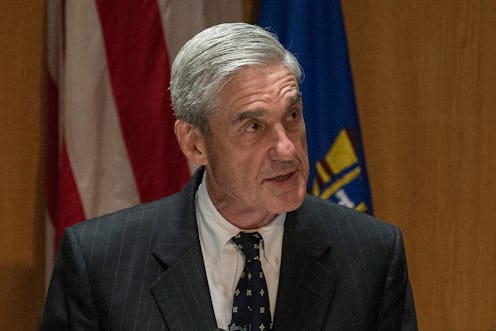
On Monday, rumors emerged that President Donald Trump is allegedly considering firing Robert Mueller, the special prosecutor who was appointed to investigate the Trump campaign's alleged ties to Russia; the White House has countered these claims. Still, in light of these new reports, many are likely wondering what would actually happen if Trump tried to fire Mueller. In theory, it would depend on how Congressional Republicans as well as the Department of Justice choose to react to Trump's (hypothetical) move to fire the special prosecutor.
The rumor that Trump is seeking to fire Mueller emanated from an interview that Newsmax CEO Chris Ruddy, a close Trump confidant, gave to PBS NewsHour. During the interview, Ruddy stated that Trump is "considering perhaps terminating" Mueller. Ruddy was asked again later in the interview if Trump was actually contemplating firing Mueller, to which he replied, "Yes."
Ruddy's comments have received a lot of attention. However, the White House has spoken out against them: On Monday evening, Press Secretary Sean Spicer released a statement saying "Mr. Ruddy never spoke to the president regarding this issue. With respect to this subject, only the president or his attorneys are authorized to comment."
Even though the White House has claimed that Trump never made comments about firing Mueller to Ruddy, many are still speculating as to what would happen if Trump tried to fire Mueller.
First and foremost, Trump cannot actually fire Mueller. Legally-speaking, experts say that that job belongs to Deputy Attorney General Rod Rosenstein, though Trump could order Rosenstein to fire Mueller. If Rosenstein refused (which he would have to do through resignation), then Trump could continue to "go down the line" at the Justice Department until he finds someone willing to obey his order to fire Mueller.
In fact, President Nixon did just this in 1973 when he sought to fire Archibald Cox, the special prosecutor investigating his administration's alleged involvement in the Watergate break in at the time. Nixon directed his attorney general and deputy attorney general to fire Cox, but they refused and resigned. Nixon was eventually able to convince the DOJ's third in command, Solicitor General Robert Bork, to fire Cox. However, after facing numerous complaints, Bork ended up appointing another special prosecutor who, after nine months of investigation, found enough damning information that Nixon decided to resign.
Thus, a Trump attempt to fire Mueller could play out in a variety of ways, depending on the reaction of the Justice Department. Many speculate that Rosenstein would likely resign if asked to fire Mueller, though are uncertain as to what would happen next. Some say Attorney General Jeff Sessions could rescind his recusal from the Russia investigation and fire Mueller himself if Trump asked and Rosenstein refused, something which certainly would cause a great deal of controversy. Either way, if Trump wanted to fire Mueller, he very likely would eventually find someone at the Justice Department willing to carry out his wish.
If Trump did indeed end up successfully firing Mueller, Congress would constitute his next hurdle. The senior Democrat on the House Intelligence Committee, Adam Schiff, has already said on Twitter that Democrats would "immediately re-establish independent counsel and appoint Bob Mueller," if Trump fired him. However, appointing an independent counsel would require Congress to reinstate the independent counsel statute, something that would require extensive support from Republicans to pass through Congress, especially if Trump vetoed it.
Thus, if Trump did indeed fire Mueller, the ultimate recourse (or lack thereof) would likely fall in the hands of Congressional Republicans, due to their majority in both Houses. Republicans could choose to reinstate the independent counsel statute and have Congress continue the Russia investigation, essentially negating Trump's efforts to stop the investigation. Or they could choose to do nothing, which, according to New York, is not unlikely, considering how they have responded to Trump's previous unprecedented actions.
Overall, it is probably safe to say that if Trump were to try to fire Mueller, let alone succeed, public confidence in the administration, and the U.S. government itself, would be very shaken. Whether or not public confidence would be restored would depend on the reactions of DOJ officials and Republicans in Congress, whose moves cannot necessarily be anticipated. For everyone's sake, let's hope that the Mueller firing scenario is indeed hypothetical and never plays out in reality.